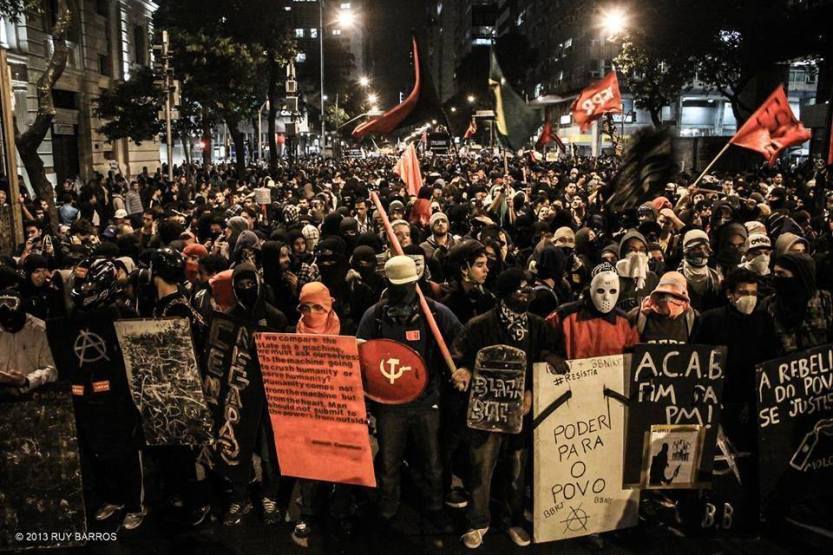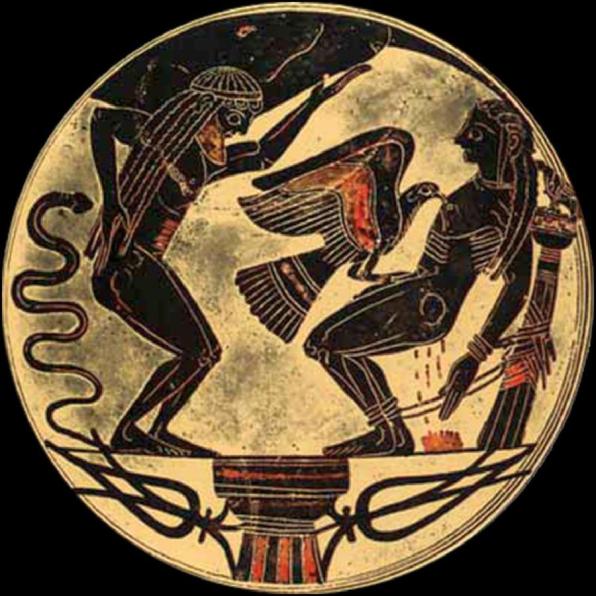 Whether the dominated think the thoughts of the dominant, or the dominant traduce those of the dominated, a certain affinity between pro- and anti-systemic ideologies is a common feature of discursive contests. Insofar as the forms of our social intercourse are recoded in our theories, this is no surprise. With the declaration that the age of extremes has drawn to a close, the spontaneous order celebrated by fervid marketeers found its counterpart in the manifold resistances augured by those who thought that mutation was no longer to be mediated by transition, that is by power and the state.
Whether the dominated think the thoughts of the dominant, or the dominant traduce those of the dominated, a certain affinity between pro- and anti-systemic ideologies is a common feature of discursive contests. Insofar as the forms of our social intercourse are recoded in our theories, this is no surprise. With the declaration that the age of extremes has drawn to a close, the spontaneous order celebrated by fervid marketeers found its counterpart in the manifold resistances augured by those who thought that mutation was no longer to be mediated by transition, that is by power and the state.
Though the genealogical threads that bind advocacy for and antagonism against the status quo are myriad, it would be difficult to underestimate the extent to which the sedimented effects of a long intellectual Cold War are still registered in the language of the left. Excoriations of the will, denunciations of the all-seeing state, grim warnings about the consequences of seeking mastery over nature and history: many of the main items in the dossier against ‘the God that failed’ are now intellectual reflexes, dependable and ubiquitous. Otherwise incompatible worldviews—authoritarian liberalism and subversive libertarianism—converge in descrying the political ills of a ‘Promethean’ desire to control collective destiny.
The anti-Prometheanism of the right can mostly be taxed with hypocrisy: Burkean calls for cautious reform have rarely impeded policies that devastated the customs and commons of the oppressed; and the much-vaunted shrinking of the state has meant a hypertrophy of its repressive apparatus, a low-intensity war of the state against society on behalf of the markets.
The anti-Prometheanism of the left, instead, is most often marked by melancholy or illusion. Melancholy: the sense that emancipation is an object better mourned than desired; that the price of our principles is prohibitive. Illusion: the persuasion that the powerless can prevail over the powerful without concentrating and organising their forces; the belief that the systems and capacities which now embody the dead labours of generations, and bear the traces of barbarisms past, can simply be abandoned or destroyed, rather than, at least in part, appropriated. Such attitudes channel, more or less unwittingly, that crucial counter-revolutionary tenet, according to which political violence and catastrophe is a consequence of imposing abstract ideas (liberty, equality, fraternity…) upon complex and refractory human material.
Prometheanism is a matter of knowledge, scale and purpose. The neoliberal right bases its apology for the omnipotence of markets, and the disastrous impossibility of planning, on the limits of our cognition. Refusing the point of view of, and on, totality, it likewise rejects modern conceptions of a political control over the scope and impact of decisions, namely in the figure of popular sovereignty, while abetting the most pernicious effects of the notion, dear to contemporary micro-sociology, that scale is produced at specific locales. Consider the present power wielded by those formidable sites for the production of massive social and political effects, rating agencies: organisations entirely beyond the purview of any collective control whatever, before which the power of parliaments pales. As far as purpose is concerned, advocates of market supremacy will never tire of proposing some variant or other of the pre-established harmony between the amoral compulsion to accumulate come-what-may and human needs, conveniently reduced to a narrow repertoire of consumer satisfactions. The abstract and inhuman domination of the form of value, commensurating all human activity under the imperative of surplus, is reputed compatible with the quaintest and most predictable of ‘our values’, to borrow from the numbing vocabulary of today’s politicians.
But the enduring association of twentieth-century hecatombs with the state, science and socialism has meant that the most sincere and bitter farewells to Promethean ambitions originate with progressives despairing of progress, pleading, with fluctuating conviction, for the piecemeal. In these times of precautionary principles and unforeseen effects, it is second nature to perceive totalising knowledge as a harbinger of catastrophe, especially when wedded to a vision of history or of humanity as endowed with a telos. Instead of querying the repeated suppressions of any popular control or democratic practice beyond the periodic acknowledgment of a pacified and passive citizenship, both collectivity and control have become targets of suspicion. Those who refuse to wean themselves off an enthusiasm for politics project insurrections without end, powers constituent but never constituted, interruptions that are never the prelude to less abject continuities.
“Melancholy: the sense that emancipation is an
object better mourned than desired.”
But the forces and fractions that collude in perpetuating the current patterns of domination are never short of organising nodes and sorting centres, strategically sited in vast networks of complicity. If the reformist mirage of the state as the sole locus of social resistance against capital dies hard, so does the myth that, amid immensely asymmetric social warfare, the amorphous swarms of an uncoordinated multiplicity would somehow carry an advantage against the sclerotic infrastructure of power. Without control, over the modalities of production and reproduction, cooperation is always cooperation for capital, and commonality merely a buffer, a positive externality socialising the costs of more direct forms of exploitation. Under the current management, anarchy will invariably be the false anarchy of the markets, and ‘spontaneous’ order will always tend to make it so that assets return to their rightful owners, as an American capitalist once quipped about the consequences of crisis.

In a world where mankind has truly become a geological agent, enjoying (and suffering) levels of logistical integration and technical capacity that would have made the shock-workers of old blanch, we may wonder whether a diffuse anti-Promethean common sense expresses a dangerous disavowal rather than a hard-won wisdom. The problems of anti-Prometheanism are rendered particularly acute if we consider its promotion as the ideological complement to an ambient catastrophism. The irony of our present predicament is nicely conveyed by the conjunction between, on the one hand, a diffuse rhetoric that we must learn to live within our means, that progressivism and productivism must be abandoned, and, on the other, the proliferation of practices and proposals for planetary governance, regulation and control—though of the kind that are invariably delegated to the functionaries of an imposed consensus, those tasked with changing everything so that nothing will change (or, if the Copenhagen fiasco is any indication, of changing nothing so that everything will change…). The widespread notion that we are acting under the pressure of time, goaded from expedient to emergency by time’s arrow, reinforces, in subtly pernicious ways, the abdication of the very idea of collective control. On the side of established powers, it perpetuates a practice of crisis-management, which from toothless moratoria and pollution credits to road maps and peace processes, is among the chief components of catastrophe. Among the forces of opposition, when it doesn’t council ecological compromises even more rotten than the historical compromises of old, it fosters anti-political survivalist fancies or misplaced hopes in the post-political virtues of ‘civil society’.
Whether in economics, ecology or geopolitics, this numbing state of anxious and impotent mobilisation serves to further entrench all of the structures of power and accumulation that perpetuate and feed off crisis, demoralising and depoliticising a disenfranchised populace that can at best acquiesce to prohibitions, recycle and adapt. But a legitimate scorn for the modern Leviathan has meant that, within oppositional cultures, the sense of emergency has counseled either a desperate hope in the vivifying virtues of collapse or a retreat into enclaves intended to prefigure the very future they are powerless to bring about. But barbarism is an even less likely catalyst for emancipation than those parties and states whose own barbarities now shadow every call, however mild, for organisation and centralism. And though small may occasionally be beautiful, defeat and insignificance aren’t.
“Withdrawal, secession and mere interruption…
will barely register on the radar of domination.”
While the anti-Prometheanism of the right conspicuously disavows the ballooning power of money, class and finance, together with the political concentration and centralisation of this power in crucial pivots, that of the left reifies the historical context and content of control. Borrowing from the feebler end of the nineteenth century critique of religion it rails against the State, Technology, Progress, and History, as if to repudiate them with the same rush of righteousness with which one could once deny God, and all, again, for the sake of an ill-defined freedom and singularity. But the problem is that in a world thoroughly hominised, in this inhospitable and even inhuman ‘anthropocene’, a totalising politics, capable of envisioning collective control, is an indefeasible requirement for emancipation. Withdrawal, secession and mere interruption—that is, revolts conceived not as inexorable moments but as an end in itself—will barely register on the radar of domination.

A new Prometheus need not take the form of the ‘Modern Prince’, the party, if the latter is regarded as a commanding height and centre supervenient on any other council, association or organisational form. Collective control must involve the control and ‘recall’, to use that important slogan of delegation in communes and soviets, of its inevitable instances of centralisation. But whether the horizon be one of radical reform or revolution, a systemic challenge cannot but take on, rather than blithely ignore, the risks of Prometheanism, outside of any forgetful apologia for state power or survivalist, primitivist mirage. Most significantly, the unreflected habit of associating power’s corruption with certain seemingly intractable contents—the possibility of violence, the proliferation of bureaucracies, the mediation of machines—needs to give way to an engagement with the social forms and relations of control. Warning against the menace of Prometheanism at a time when the everyday experience of the immense majority is one of disorientation, powerlessness and opacity—that is, one where knowledge, scale and purpose are rent asunder—is simply to acquiesce in the exercise of power in the usual sites and by the usual agents, in that particular mix of anarchy and despotism that marks the rule of and for capital.
For better and for worse, the world we inhabit is an immense accretion of dominations, the living labours of centuries mortified into the massive infrastructures that channel our daily lives, natural processes at once subsumed and refractory, and a vast accumulation of ends, endings and extinctions heterogeneous to original plans, when plans there were. In this regard, any politics today which is not merely a vapid accompaniment to dispossession and degradation, whether it claims the legacy of painstaking reform, desperate conservation, or comprehensive revolution, cannot but confront the ‘Promethean’ problem of articulating action and knowledge in the perspective of totality. To the extent that we regard Prometheus as ‘the most eminent saint and martyr in the philosophical calendar’, emblem of servitude refused to abstract and alienated powers (God, State, Money, Capital), then Promethean should be a proud adjective for those who consider revolution not as a passionate attachment to some flash of negation or other, but as a process of undoing the abstract social forms that constrain and humiliate human capacities, along with the political agencies that enforce these constraints and humiliations.

_____
Alberto Toscano teaches sociology at Goldsmiths, University of London. He is the author of Fanaticism: A History of an Idea, and an editor of the journal Historical Materialism.
via STIR
Related articles
- Pernicious Prometheus (utopiaordystopia.com)
- Russell Brand takes on the crisis of civilisation. But what now? | Nafeez Ahmed (theguardian.com)
- The Language of Neoliberalism (counterpunch.org)
- Conflict, Revolt and Democracy in the Neoliberal World (2013) (foucaultnews.com)
- Promethean Storage Tower (forerunnerarmy.wordpress.com)
- Promethean Soul (forerunnerarmy.wordpress.com)
- Sevan Bomar – Spiritual Sovereignty [PrometheanReach] (disclose.tv)
- Planetary/Human Evacuation (naughtthought.wordpress.com)
7 thoughts on “The Prejudice Against Prometheus ~ Alberto Toscano”